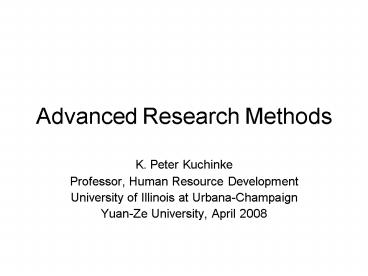Advanced Research Methods PowerPoint PPT Presentation
1 / 17
Title: Advanced Research Methods
1
Advanced Research Methods
- K. Peter Kuchinke
- Professor, Human Resource Development
- University of Illinois at Urbana-Champaign
- Yuan-Ze University, April 2008
2
Outline
- Research Paradigms
- Traditional social science research
- Critical/emancipatory research
- Action Research
- Postmodern Research
- Criteria of good Research
- Publishing Research
3
Traditional Views of Research
- Finding the truth
- Knowledge based on objective evidence
- Knowledge gained through strict methods
- Knowledge gained by experts
- Open to the public
- Open to scrutiny and inspection
- Expert way of finding things out
- Privileged way of knowing
4
Brief History of Science
- Age of Enlightenment
- Physics and Astronomy
- Liberation from Tradition and Religion
- Advancement and Progress
- Social Sciences
- Positivism Debate
- Objectivism vs. subjectivism (ontology)
- Realism vs. nominalism (epistemology)
- Parallel modalities
- Critical Realism
- Qualitative and quantitative methods
5
Critical Science
- Knowledge and Interest (Habermas)
- Types of Interest
- Instrumental
- Understanding
- Emancipatory/liberation
- Uses traditional social science methods but with
different goals
6
Postmodernism
- Philosophical movement in Literature, Arts,
Humanities, Social Sciences - Questions traditional goals of science
- Key ideas
- Impossible to decide meaning objectively
- Grand Narratives are not plausible
- Language and power determine reality
- Understanding/interpreting our world through
history and deconstructing meaning - Implications for research
- Researcher and subject constitute each other
- Knowledge driven by interests
- Ongoing dialogue
- Research is story telling
7
Good Research
- Advances knowledge/understanding in an important
area - Builds on existing scholarship
- Is methodologically/technically sound
- Addresses important/interesting questions
- Leads to some practical insights
- Helps us understand world better/differently
- Leads to alternative possible action strategies
8
Research Journals
- Human Resource Development International
- Importance of the topic
- Theoretical importance
- Practical Importance
- Appropriateness
- Problem Statement
- Relevance of Literature Review
- Research Design and Methods
- Results and Conclusions
- Contributions to the field
9
Publishing in International Research Journals
- Why publish?
- What to publish?
- Where to publish?
- How to succeed in publishing
- Mistakes to avoid
10
Purpose of Publishing
- Scientific progress based on written
contributions - Scientific ideas evaluated based on written
contributions - Extrinsic Reasons
- Requirement for graduation/promotion
- Prestige, reputation, visibility
- Reaching a wide (international) audience
- Intrinsic Reasons
- Pride, Self-efficacy
- Sense of accomplishment
- Determine standing in the academic community
11
Types of Contributions
- Empirical Research
- Meta-Analyses
- Theory Development
- Model/Conceptual Development
- Integrated Reviews of Literature
- Exploratory Studies (Research Notes
- Opinion Pieces
- Responses to Published articles
- Book Reviews
12
Maturity of Contributions
- Emerging Fields/Areas
- Exploratory research
- Descriptive research
- Definitional writing
- Developing research agendas
- Established Fields/Areas
- Hypothesis testing
- Theory development
- Construct validation
- Meta-analyses
13
Types of Research Journals
- SSCI listing
- Standing within Disciplines/Fields
- Tier 1, 2, 3 etc.
- Domain-specific journals
- E.g. Cross-Cultural Management Human Resource
Development International - Regional Focus
- E.g. Asia Pacific Journal of Management
- Audience specific journals
- E.g. Harvard Business Review
- Special sections, topical monographs
14
Successful Submissions
- Quality of contribution to the literature
- Originality
- Rigor
- Relevance
- Match with journal scope and aims
- Conforms to editorial guidelines
- Quality of writing
- Willingness to revise
15
Common Mistakes in Submitting Papers to Research
Journals
- Practitioner Papers
- Introductions for the Uninformed
- No Original Relevance
- Targeted at another discipline
- Replica of already published work
- Guideline violations
- Not theory-based
- Uninvited resubmissions
- Source Kilduff, 2007- AMR
16
Publishing Violations
- Submitting to several journals at once
- Misrepresenting authorship Misrepresenting
ownership of ideas and data - Plagiarizing
- Using identical data set in multiple submissions
17
Tips for Novice Scholars
- Non-refereed contributions
- Conference Proceedings
- Match quality of contribution and rating of the
journal - Maybe build on practitioner focused publications
- Be prepared to revise and revise and revise and
revise - Be prepared to resubmit
- Second author
- Use masters thesis or dissertation
- Dont get discouraged!

